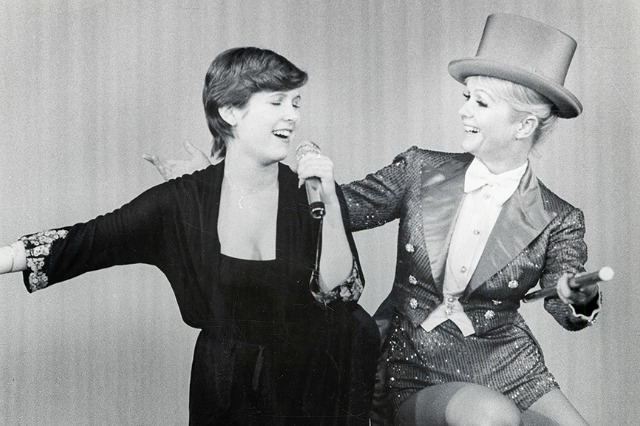Deaths Of Carrie Fisher & Debbie Reynolds Don't Dim Affectionate 'Bright Lights'
By Joel Wicklund in Arts & Entertainment on Jan 6, 2017 3:08PM

Photo: Home Box Office, Inc.
Unexpected death will, for a while, color anything related to the deceased. So the HBO documentary Bright Lights: Starring Carrie Fisher and Debbie Reynolds will certainly have a very different, much more bittersweet flavor when it's broadcast Saturday night than when it played at film festivals last year.
The sudden passing of Fisher on Dec. 27, followed a day later by the death of her mother, Reynolds, felt like fate delivering a cruel double blow—surely most severely to their friends and family, but also to fans of multiple generations. HBO's decision to move the premiere date up (it was originally scheduled to air in March) might be a ratings grab, but it doesn't make this intimate and highly entertaining portrait of the showbiz icons any less worthwhile. And for devoted fans of either woman, maybe it will serve as something like a celebratory public wake.
Death was kind of a minor supporting character in Bright Lights even before last month's sad news. It's clear Reynolds' health was declining as filming progressed. Her final nightclub performance and a physically challenging appearance to accept her Screen Actors Guild Life Achievement Award reveal her "show must go on" spirit fading with those struggles. Indeed, Fisher acknowledged the documentary was in large part a salute to the end of her mother's performing career and, with it, the closing of a major chapter of her life.
Fisher also throws death into her mix of witty remarks on dark subjects, including her battles with substance abuse and bipolar disorder. The doc also includes footage from 2010 of her tending to her dying father, Eddie Fisher, the singing star who became a tabloid pariah after leaving Reynolds and their young children in the late '50s to marry Elizabeth Taylor.
But Bright Lights by no means comes across as some kind of advance eulogy for its stars. It's breezy, fun and largely lighthearted—as much about the eccentricities of the performers as anything. While the movie charts some of the ups and downs in the careers of both women, don't expect detailed stories of the making of Singin' in the Rain or Star Wars. Directors Alexis Bloom and Fisher Stevens (who worked with both women as an actor) keep the focus on the tight-knit, if consistently bumpy mother-daughter dynamic.
Despite living next door to each other, the dichotomy between the lifestyles and attitudes of Fisher and Reynolds was amusingly wide. Reynolds' home is a combination of proper grandmotherly décor and a vintage Hollywood museum, while Fisher's residence is covered in pop culture kitsch. Reynolds seems constantly wary of the camera and how she will appear, while Fisher carries herself with DGAF verve.
The affection between them, however, is also abundantly clear, as well as their emotional dependence on each other. By the time Bright Lights was filmed, it seemed both had reached a stage where any serious differences or past animosity between them had become little more than trivial annoyances.
Fisher, a successful author and screenwriter (mainly as uncredited "script doctor" on other writers' screenplays), had also clearly made peace with her other career achievements being completely overshadowed by the Star Wars franchise. Bright Lights shows her at fan conventions, sitting for autograph and photo sessions she hilariously brands "celebrity lap dances." Though the outrageous fees fans often pay for these encounters padded Fisher's fortune, she does seem genuinely appreciative of the public's affection, though appropriately bemused by Star Wars obsessives.
The film doesn't hide the life of comfort and coddling both stars enjoyed, which directors Bloom and Stevens capture in several scenes. But they also present each woman as a survivor: Carrie crawling back from near-suicidal addiction; Debbie rebounding from personal heartbreak and financial crisis.
The ego-driven tension of show business family life is also illuminated. Reynolds' love for her daughter comes through, but so does her "stage mother" disappointment that Fisher didn't pursue singing. As Fisher's semi-autobiographical novel Postcards from the Edge (and its screenplay) demonstrated, the line between public and private in the Reynolds-Fisher home was razor thin, which makes this final, authorized peek behind their curtains fitting.
Interestingly, during the documentary's festival run there seems to have been some confusion regarding the title, or possibly even a late title change. Some reviews after it screened at Cannes listed the movie with the names reversed: Bright Lights: Starring Debbie Reynolds and Carrie Fisher. That title was also used in the Chicago International Film Festival schedule (and our festival coverage) and even on HBO's own original teaser trailer.
Simple publicity error? Maybe, but now it seems very appropriate that this famous mother-daughter duo, seemingly inseparable even by death, would share lead billing, even if only inadvertently.
Bright Lights: Starring Carrie Fisher and Debbie Reynolds. Directed by Alexis Bloom and Fisher Stevens. 95 mins. No MPAA rating.
Premieres Saturday, Jan. 7 on HBO.